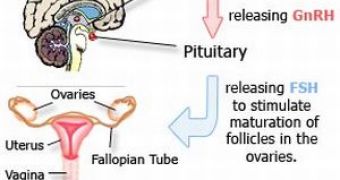An international team at the German Cancer Research Center has studied the signaling pathways through which estrogen hormone regulates brain activity that signals the start for ovulation.
Many times, female infertility is due to interruptions on these circuits. Estrogen, which is produced in the ovaries, inform the brain around the 14th day of the fertility cycle that the egg is mature. Stimulated neurons send the information to gonadotropin producing brain cells from the pituitary gland and this hormone starts the ovulation. "The better we understand how estrogens work and what may go wrong in the interaction with neurons, the more possibilities we will have to counteract infertility," says Professor G?nther Sch?tz, head of the Division of Molecular Biology of the Cell at the GCRC.
Two types of estrogen receptors, alpha and beta, are found in centers of the hypothalamus (a brain part). Mammal females suffering from lesions in the ovaries, mammary glands and uterus lack the estrogen receptor alpha. "Every single one of these defects is sufficient to make the animals infertile," says biochemist Dr. Tim Wintermantel. But it seems that estrogen receptor beta is also important for fertility.
When the team gave additional estrogen to mice females lacking the estrogen receptor alpha only, the brain failed to release gonadotropin for ovulation. But when the researchers administered synthetic molecules specifically active only for estrogen receptor alpha to healthy female mice, this alone triggered gonadotropin release. "The estrogen receptor alpha needs to be not only present but also activated." said Wintermantel.
The researchers were puzzled because the gonadotropin releasing neurons do not possess the estrogen receptor alpha. Then how do these neurons receive the signal to release gonadotropin? The team found that a second group of neurons in the hypothalamus transmits the message. They discovered that these mediators possess alpha receptors and through their axons are connected to the gonadotropin neurons in the pituitary gland. "This could be important, for example, for patients who lack a specific receptor on the gonadotropin producing cells and who are infertile because of this," Sch?tz says.

 14 DAY TRIAL //
14 DAY TRIAL //